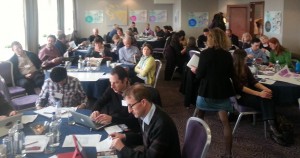The ELESIG network brings together people who research learners’ experiences – especially in digital settings – with people who can bring that evidence to bear on day-to-day practice in institutions. Both groups are engaged and engaging people, and it was obvious we should put our Digital Student outcomes in front of them. In the event, more than 40 people turned out for a full days’ discussion in Bristol, which included a session specifically on our findings.
It was great to hear from other researchers working in the same space, including Megan Lawton on international student and staff perceptions of digital literacy, and Hani Mori on digital literacies and ’empowerment’. You can access their slides and ours from the ELESIG slideshare account.
You can also find out more by following the #digitalstudent and #elesig twitter tags and by checking out the ideas for further research that participants produced. This googledoc includes research questions, methods and approaches to help us understand how students experience the digital environment for study and how we can address their expectations. It is no longer editable but it is freely available for download and for comment.

